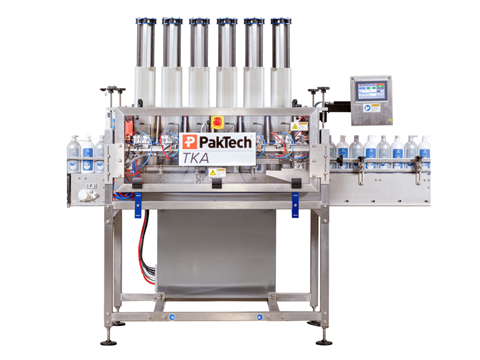
PakTech has introduced its TwinKlip Applicator, aiming to provide ‘precise, consistent, and automated’ application of PakTech TwinKlip Handles to a variety of products such as shampoo, conditioner, and body wash.
Apparently, a single-file conveyor sends loose bottles through the machine, which automatically applies one TwinKlip Handle per pair of bottles. PakTech hopes to improve efficiency and streamline end-of-line operations with the applicator, which it says can process 12 bottles per batch at ten cycles per minute, with a 15% overspeed capability for short bursts.
The company claims the TwinKlip Applicator saves time, reduces labour costs and increases productivity, as well as adjusting to accommodate multiple different products on the same machine without sacrificing speed.
PakTech adds that colour-coded change parts can be switched out quickly and each has its own recipe programmed into the system and selectable on the touchscreen human machine interface (HMI), designed to minimize machine downtime during product changeover. The TwinKlip Application loading tools apparently double as Klip magazines, extending the runtime between reloads.
The applicator is said to be fully adjustable to run different products on the same base machine, with an adjustable touchscreen HMI for machine operation, recipe selection, and troubleshooting. According to PakTech, there is a colour LED lightbar to indicate the machine status to the operator and bystanders, and a bypass mode to allow bottles without PakTech Klip Handles to pass through the machine without application.
“The TwinKlip Applicator is the first commercially available automation equipment capable of applying TwinKlip Applicator handles. It is designed to increase production line efficiency and reduce overall cost of secondary packaging,” said Stephen Snider, application engineer at PakTech. “This automated equipment can free up staff for more creative and value-added work and is small and energy efficient enough to fit in any packaging line.”
In June, Shawpak announced it had used thermoform lines integrated into robot cells in a single-piece-flow system for medical devices, as part of a recent project in the US. The company states the system’s thermoform equipment takes up on average 70% less space than a traditional system, aiming to provide a good fit immediately after assembly and production lines and reduce work-in-progress and handling.
This month, Schneider Electric and GR3N partnered to develop the ‘first’ open automation system for advanced plastic recycling – which, in the scale-up of GR3N’s depolymerization technology, is set to reduce human error by 40% and engineering costs by 30%. Apparently, the process results in packaging and textiles with comparable quality to those made of virgin plastics, while simultaneously unlocking circularity for hard-to-recycle plastics.
If you liked this story, you might also enjoy:
How are the top brands progressing on packaging sustainability?
Sustainable Innovation Report 2024: Current trends and future priorities
Reuse vs. single use – which is better for the environment?
The ultimate guide to global plastic sustainability regulation














No comments yet